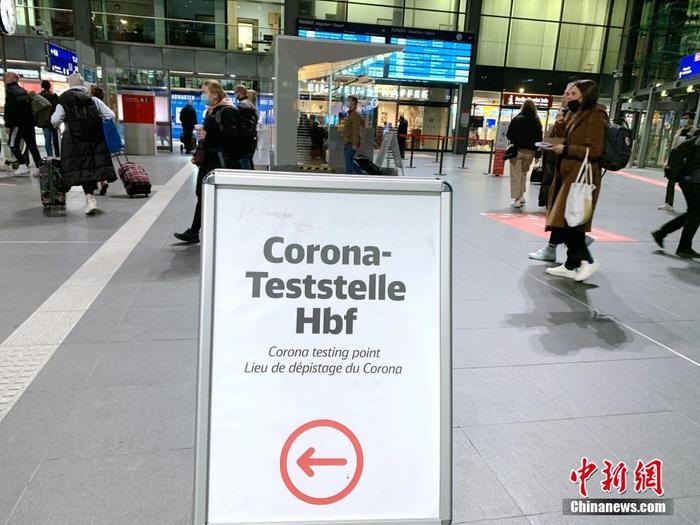China News Service, Beijing, October 27 (Reporter Pang Wuji) In recent days, the European epidemic has rebounded fiercely. The number of confirmed cases in a single day in many countries has increased explosively, several times the peak level of the first wave of the epidemic in April this year.
Faced with the severe situation, multinational control measures have been upgraded again.
Experts believe that the escalation of blockade measures may delay the economic recovery of the euro zone, and the European economy faces the risk of a "second recession".
Michael Ryan, Executive Director of WHO's Health Emergencies Project, said that last week, about 46% of confirmed new crown cases and one-third of deaths worldwide came from Europe, and Europe is undoubtedly at the epicenter of the epidemic.
On October 12, local time, Cambridge, England, signs reminding people to maintain social distancing hung on the roadside.
According to Worldometer's real-time monitoring, in the past 24 hours, Russia, France, Spain, Britain, Italy, Belgium, the Netherlands, Poland, Czech Republic, Switzerland and other European countries have newly confirmed cases in a single day exceeding 10,000.
Multi-country control measures have been upgraded again, and France announced the expansion of the curfew area.
Spanish Prime Minister Sanchez announced on the 25th that Spain will once again enter a state of emergency.
On the 25th local time, Italian Prime Minister Conte signed a new prevention and control law to upgrade control measures from shortening the business hours of catering establishments.
The rising number of confirmed cases and blockade measures once again cast a shadow on the fragile European economy.
European Central Bank President Lagarde recently said that he is worried that the second wave of the epidemic will delay the economic recovery of the euro zone. The epidemic may make the expected "V"-shaped recovery trajectory faltering in the second half of the trajectory.
Affected by the "second blockade", economic activity in Europe weakened again, with high-frequency indexes such as trade and catering consumption reflected.
The picture shows the sign of the new crown detection point placed in the Berlin Main Station on the evening of October 25, local time.
Photo by China News Agency reporter Peng Dawei
The latest German ifo business climate index released on the 26th turned to decline after five consecutive months of recovery.
The Eurozone Composite PMI recently released by IHSMarkit fell from 50.4 in September to 49.4 in October, a four-month low.
The PMI index is below the 50 line of prosperity, reflecting the overall contraction of industry and commerce in the Eurozone.
The IHSMarkit report believes that the second wave of the Eurozone epidemic hit the service sector and offset some of the rebound in manufacturing output.
During the month, the unemployment rate in the Eurozone declined, but the forward-looking indicators deteriorated: the inflow of new business fell again, and corporate optimism for the next year fell to its lowest level since May.
Sun Binbin, chief analyst of fixed income at Tianfeng Securities, pointed out that the second outbreak of the European epidemic and the no-deal Brexit of the United Kingdom undoubtedly make the prospects for European economic recovery worrying.
However, the epidemic and Brexit are only exogenous shocks affecting European economic growth, and they may also face four problems themselves:
First, the European economic cycle has peaked and declined before the epidemic;
Second, economic recovery relies too much on loose monetary policy (Europe has implemented a negative interest rate policy);
Third, high government debts and serious internal divisions in the Eurozone countries restrict fiscal policy space;
Fourth, the company's balance sheet has deteriorated.
On October 25, local time, Spanish Prime Minister Sanchez announced that a new round of national emergency will be implemented across the country from that afternoon to curb the new crown epidemic.
The picture shows the police patrolling the streets in Barcelona, Spain.
Sun Binbin pointed out that under such a background, even in the face of the counterattack of the epidemic, European countries are expected to be unable to further reach a large-scale financial support plan in the short term, and monetary policy will most likely need to be looser.
Therefore, the process of getting out of the epidemic in Europe is expected to be slow.
However, Dong Zhongyun, director of the AVIC Securities Finance Research Institute, believes that comparing the measures of the first wave of the epidemic and the second wave of epidemics in the five European countries, it can be seen that although the newly confirmed cases have repeatedly reached new highs, the second wave of epidemic prevention and control efforts It is far from the state it was in the first wave of the epidemic.
He believes that the biggest impact of the epidemic on the economy is a run on medical resources under the impact of the epidemic, forcing the government to block the economy.
At present, there is no run on medical resources in the five European countries, and the three monitored indicators have not yet reached the alert value. The worsening of the epidemic situation will lead to a complete suspension of production and work in major European countries.
(Finish)

